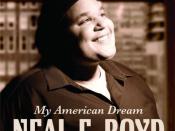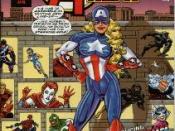Fitzgerald condemns his readers to the knowledge that the American dream is not the key to eudemonia but rather the stair way which once started upon leads inescapably to destruction. When we refuse to accept reality, we lose it completely.
The notion of the American dream is a primary concern in the novel. Coincidentally Fitzgerald shows it to be just that. A dream. The frequent, yet subtle references to theatre, fantasy and ideals throughout the novel reinforce this. Like any ideal, it is flawed through human conception and action.
It is Nick who describes Gatsby's transformation from "young Gatz" to "Jay Gatsby", likening it to Platonic conception. It is in this sense that Gatsby has ultimately doomed himself. Plato's beings were perfect, ideals of human aspirations, formed by the infallible sculptor, in contrast, "the vague contour of Jay Gatsby had filled out" with the help of a "singularly appropriate education" by a man who embodied the "savage violence of the frontier brothel".
Regardless of the fact that this "ideal Gatsby" is fundamentally flawed, Gatsby's inability to truly become the ideal also hinders him. He is neither one thing nor the other, instead he dances along the precipice, unable to bear being "young Gatz" but also unable to transform completely into "Jay Gatsby", this is evident both through his conspicuous absence from his own elaborate parties, "he was not there"; and in the flaws of his props, eg. the "absolutely real" books which adorn the library but have never been read.
Every thing about the created character of Jay Gatsby is extravagant, as though young Gatz feels the need to over compensate lest someone see through his charade. Like the books, the parties, the clothes and the "elaborate formality of speech" Daisy is yet another prop, similar...


